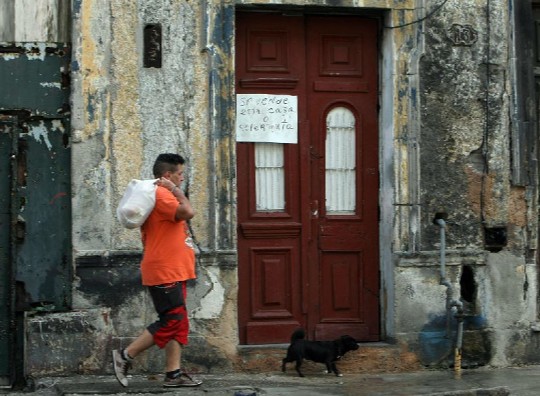
Wendy Guerra, Habáname, 15 December 2014 — About three years ago, a young man – tall, blond and ungainly – would haul an enormous sack full of DVDs of pirated movies, music videos, TV shows and series. Today, this same young man – now more poised and better dressed – walks the streets of Miramar with a small memory stick in his pocket, dispensing information to any of the households that can pay 15, 5 or, most commonly, 10 CUCs [Cuban convertible pesos] per week to download the latest broadcast content from international channels. For those who are unable to pay this fee, for those who lack the necessary resources, there are the memory devices that we record and distribute. This happens week after week in every Havana neighborhood.
“The Packet.” This is what we locals call the mountain of information that, on a weekly basis, the anticipated visitor sells and distributes to relieve the Cuban people’s dearth of options for visual references and news sources.
Updates of www.revolico.com or www.porlalivre.com – sites so useful for buying and selling home electronics, food, medicine, clothing and items of all kinds for the island’s resistance, advertisements for paladares (restaurants) and animal clinics, rentals of privately-owned vehicles and beauty shops – all of these form part of the so-called “packet” in addition to premieres of audiovisual productions.
What’s curious about all of this is that many Cuban producers pay 15 CUCs for their productions to be added to the local packet, the domestic one that arrives weekly at your door. This is how the great collage of images and words grows, not just with content from HBO or Channel 41, Univisión or Televisa, but also those productions which have been rejected by the ICAIC or which, because of contractual issues with co-producers, cannot immediately be seen in Cuban living rooms.
Dealer: “Please, I need to include in this week’s packet that movie by Padura*, and yours, too. If you get it for me, I’ll leave you a free month’s worth of programming. Everybody is asking for these movies and they’re driving me crazy. Do you have them already? Are they good?”
Producer: “Sure, here they are.”
This is how the popular information “combo” is sustained on a national scale.
The thing is, “being in the packet” is an honor for those writers, artists, producers and actors who must wait for the approval of institutions such as ICAIC. Meanwhile, this delay tyrannically closes the possibility for excellent films such as “Return to Ithaca”* being available to the public – that is, we who think that we still control what we can view and comment-on. Poor us!
The packet is our access to the sea. To be in the packet is the best way to insert ourselves in the real life of thousands upon thousands of Cubans who want to know what is happening in their own environment.
“They” can control the movie houses because they own them, and these venues are subject to their arbitrary sense of vigilance. But in the privacy of our homes, in the personal space inside our heads, in the packet made a la carte and to order according to our needs, nobody can meddle.
Change happens, everything changes, and institutions start losing their meaning.
The packet: Free and domestic, kaleidoscopic informer, where we all wish to enter, as spectators or creators.
* Translator’s Note: This film, with a screenplay by noted Cuban writer Leonardo Padura, was censured by the Cuban government.
Translated by: Alicia Barraqué Ellison
